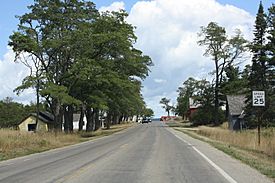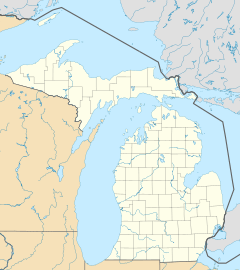Glen Haven, Michigan facts for kids
Quick facts for kids
Glen Haven, Michigan
|
|
|---|---|

Looking north on the former M-209
|
|
| Country | |
| State | |
| County | |
| Township | Glen Arbor |
| Part of | Sleeping Bear Dunes National Lakeshore |
| Settled | 1857 (Sleeping Bearville) |
| Government | |
| • Type | National Park Service |
| Elevation | 598 ft (182 m) |
| Time zone | UTC-5 (EST) |
| • Summer (DST) | UTC-4 (EDT) |
| ZIP code(s) |
49630
|
| Area code(s) | 231 |
|
Glen Haven Village Historic District
|
|
| Area | 16 acres (6.5 ha) |
| Built | 1857 |
| NRHP reference No. | 83000882 |
| Added to NRHP | June 24, 1983 |
Glen Haven is a cool old village right on the shore of Lake Michigan. It's part of the amazing Sleeping Bear Dunes National Lakeshore in Michigan. You can visit the beautiful Lake Michigan beach here. There's also a restored General Store and a Blacksmith Shop. This small community is in Glen Arbor Township.
Contents
The Story of Glen Haven
Glen Haven started as a busy port on Sleeping Bear Bay. Ships would stop here to get firewood, lumber, and other supplies. In 1857, a man named C. C. McCarty built a sawmill and an inn. This was the beginning of the settlement, which was first called Sleeping Bearville. By 1881, the village had 11 buildings.
From Lumber to Tourism
Over time, the trees near the shore were all cut down. It became harder to find firewood for the steamships. In 1911, David H. Day came to Glen Haven. He worked for a shipping company and needed to find more wood. He built a new sawmill between Little Glen Lake and the sand dunes. Trees were cut from around the inland lakes. Then, they were floated to the sawmill.
A small steam train carried the lumber to the Glen Haven port. The train tracks went along the base of the sand dunes. They ended on a long dock where wood was loaded onto ships. You can still see the old dock poles in the water today!
Becoming a National Lakeshore
On October 21, 1970, the U.S. Congress decided to create the Sleeping Bear National Lakeshore. The National Park Service bought many private properties in the area. This helped protect the beautiful natural spaces.
Cool Places to Visit
Glen Haven has several interesting historic buildings you can explore.
Cannery Boathouse Museum
The old Glen Haven Canning Co. building is now a museum. It was first a warehouse. Later, in the 1920s, it was used to can cherries. Today, it's the Cannery Boathouse Museum. Inside, you'll find historic small wooden boats. These boats were used to travel between Glen Haven and the North and South Manitou Islands. This area is called the Manitou Passage.
Sleeping Bear Point Coast Guard Station Maritime Museum
Near the waterfront, you'll find the Sleeping Bear Point Coast Guard Station Maritime Museum. This building was once a U.S. Coast Guard Life Saving Station. It was built in 1901 and moved to its current spot in 1931. The station closed in 1941.
The museum teaches you about the U.S. Life-Saving Service and the U.S. Coast Guard. You can also learn about the history of shipping on the Great Lakes. In the summer, you might even see demonstrations of old rescue drills! They show how rescuers used to fire a line to a ship in trouble.
M-209 Road
The road leading to these attractions was once called M-209. It was the shortest state highway in Michigan! In 1995, it became a county road. But many people still call it M-209 today.
Sleeping Bear Dunes National Lakeshore
Glen Haven is part of the amazing Sleeping Bear Dunes National Lakeshore. This national park is located on the "little finger" of Michigan's lower peninsula. It covers about 35 miles (56 kilometers) of Lake Michigan's eastern coastline. It also includes North and South Manitou Islands.
The park is famous for its incredible natural beauty. You'll find thick forests, sandy beaches, huge sand dunes, and features left behind by ancient glaciers. The Lakeshore also has many historic sites. These include the 1871 South Manitou Island Lighthouse, old Life-Saving Service stations, and historic farm areas.
Images for kids
See also
 | Jackie Robinson |
 | Jack Johnson |
 | Althea Gibson |
 | Arthur Ashe |
 | Muhammad Ali |





